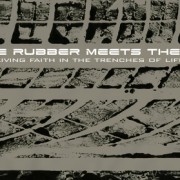I am now nine months into my fourth ministry transition as a senior pastor. Four?!? Yes, four. I transitioned out of the pastorate at Calvary Chapel New Brunswick after founding the church in 2007. Then I simultaneously transitioned out of both Calvary North Bay and Calvary San Francisco at the end of 2011. Now I am in the midst of transitioning into the pastorate at Crossroads Community Church here in Vancouver, WA. After sitting down with Warren Bird (of Leadership Network) this past week, where we discussed our current transition, I felt that it was time to start writing about transition.
Side note – By all accounts, the transition here at Crossroads is going exceedingly well. Both in internal and external realities, things are amazing. The church is growing in size and depth. From a leadership perspective, things are healthy. But, since this is a blog about doing ministry, I am going to try and write it in a detached manner to talk through some of the potential issues and downfalls (not that we are necessarily experiencing them).
Transition is an important subject. Primarily because it is always happening. Transitions are always taking place. Within the ecclesiastical world, transition is important because there is a generation of boomer pastors who are on the cusp of transitioning. This is not to say that older pastors are not needed or useful. Far from it. But it is common for congregations to age along with their pastor. There are pastors who have been mightily used of God in congregations for 30+ years. As they look at their congregations, stereotypically, their congregations have aged along with them. For many evangelical churches, they want to learn from the mainline denominational churches who simply let their congregations age without transitioning. So transitions are on the horizon.
So I wanted to sketch out a few broad brush strokes about transition.
1) A race can be lost because of a botched transition.
As pastors, we realize that God’s kingdom and purpose is larger than the ministry that he has entrusted to our lives. We are a part of something much greater than ourselves. As pastors and church planters, we realize that we are part of a relay race. We are not sprinters. The health of the churches we pastor and the cause of kingdom in our cities must continue until the Lord returns. Our leg of the race is vitally important. And we are responsible for it. But in order for a relay race to be won, each ‘passing of the baton’ must be smooth and thoughtful. A number of legs of the race can be run well. But one botched transition can be catastrophic. So it is essential to realize that the stakes are high and eternity hangs in the balance. We need to transition well.
2) There is a difference between transition and change.
For us here at Crossroads, this is one of the big lessons. Transition and change are actually different. The outcome is the same. But the difference between transition and change is the route you take to get there. For most church transitions, there is one pastor and then there is another pastor. There is a new under-shepherd with a new vision. But for most churches, there is an attempt to jam a square peg into a round hole. There is an abrupt change from one to another with little thought about flow, intentionality and concern for people. This is why church transitions have such a high turn over rate. Imagine a speed boat is heading in one direction. A new driver wants to take a different course so they just turn the wheel. All the people sitting on the sides of the boats go flying overboard. This is change. But transition says, “Hey everyone, we are going to change directions here. We want to head to a different place. Please hold on. I’m am going to turn a bit slower than I’d like to but I don’t want you to go flying because I actually care about you and your well being.” Creating change is easy (especially for the change agent). But you will lose the very people that God calls you to care for. Transition happens slower, more deliberately, more intentionally. You still get to the desired outcome. Sure it happens slower but more people will be there.
3) Transitions are hard because they begin with an ending.
This is why transitions are so hard. They always begin with an ending. Here at Crossroads, the beginning of our transition began with the announcement that Bill Ritchie was not going to continue on as Senior Pastor in the next few years. Think about it. The transition began with an ending. Endings are hard for people. The end of an era. Hard. The end of a relationship (even a bad one). Hard. The end of life. Hard. Endings are hard. But when we can acknowledge that an ending is hard and we can minister to that challenge, the people of God respond! In the early Jewish Christians, like Peter in Galatia, is was hard to not think that they were more righteous then the Gentiles who ate non-Kosher food. It takes some time for people to get comfortable with the ending. So in transition, we need to give people the time and space to work through the initial ending. If we allow for time to process, pray and get comfortable with the ending, then the transition can begin with some productivity. But we cannot rush this.
4) Crosscurrents are part of every transition.
Part of a transition is realizing that crosscurrents will happen. If you are truly transitioning there needs to be the opportunity for the past and the future to exist simultaneously in the same space. Crosscurrents can be choppy. They can also drown people if it is unexpected. So we need to help lead people to understand that crosscurrents are just part of this. There is the vision that was and then there is the vision that will be. But we are here in the present with both currents existing. In the passing of the baton analogy from a relay race, each runner needs to understand the other runners style and approach in order to transition well. For Bill Ritchie and I, we are constantly talking about his vision for Crossroads and how that shaped where the ministry is today. I also share about where I see things going in the future. Neither is better or worse. They are sometimes just different. And as long as there is mutual respect and understanding, those crosscurrents can be navigated. As I often tell people, “We are not what we were. We are not what we will be. But we are moving in the right direction.” This is a simple definition of the crosscurrents of a transition.
5) For the sake of the body, steadiness is key.
In all of this talk about transition, I have found that the key to a healthy transition is that it be handled steadily. Steadiness must be from implementation to execution to culmination. A steady hand is totally needed. For most transitions, there can be seasons of steadiness. But there is often parts of the transition that are herky-jerky. Here at Crossroads, we feel great about how we have done thus far. The body has responded (and even grown) in this process. But we are not done yet. Bill and I were just speaking recently about the need to be ‘steady-on’ in this process. So far so good. But we want to set a steady pace and continue on well.










